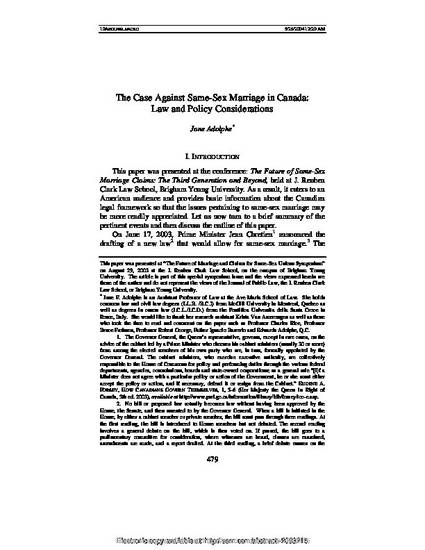
Article
The Case Against Same-Sex Marriage in Canada: Law and Policy Considerations
Brigham Young University Education and Law Journal
(2003)
Abstract
This paper was presented at the conference: The Future of Same-Sex Marriage Claims: The Third Generation and Beyond, held at J. Reuben Clark Law School, Brigham Young University.
The author explores the legal and policy related reasons behind the same-sex marriage debate. She explores the chronology of events and the key legal developments that have paved the way for the same-sex marriage debate; explains why Canadian society is now facing the same-sex marriage debate by exploring the legal institutions of Canadian society; and reviews two approaches to same-sex-marriage in Canada and critiques their philosophical basis by suggesting that the proponents of same-sex marriage offer no workable philosophy as a foundation for that legal system.
The author concludes by presenting five main arguments against redefining marriage: (1) Marriage and same-sex partnerships are so radically different that to treat them the same would mean distorting the authentic meaning of human dignity and the very notion of marriage. Such redefinition would also distort the authentic meaning of equality.; (2) offend the dignity of children; and (3) overlook scientific evidence essential to protecting the rights of children; (4) undermine the importance of the natural family; and (5) disturb the Canadian social order.
Keywords
- same-sex marriage,
- Canada,
- children's rights,
- natural law
Disciplines
Publication Date
July 1, 2003
Citation Information
Adolphe, Jane F. "The Case Against Same-Sex Marriage in Canada: Law and Policy Considerations." Brigham Young University Education and Law Journal 18, no. 2 (2003): 479-542, available at: https://digitalcommons.law.byu.edu/jpl/vol18/iss2/7
